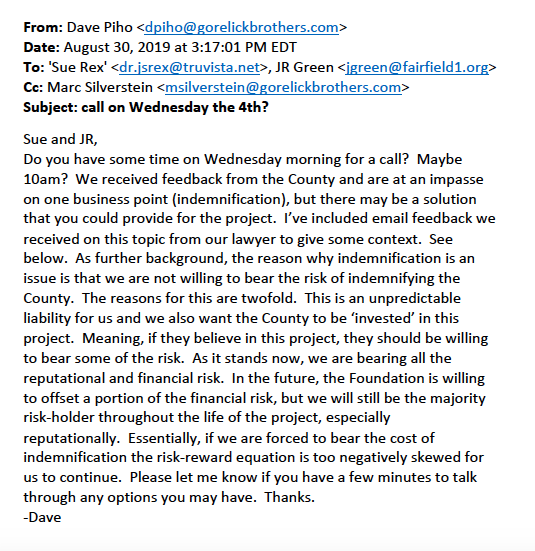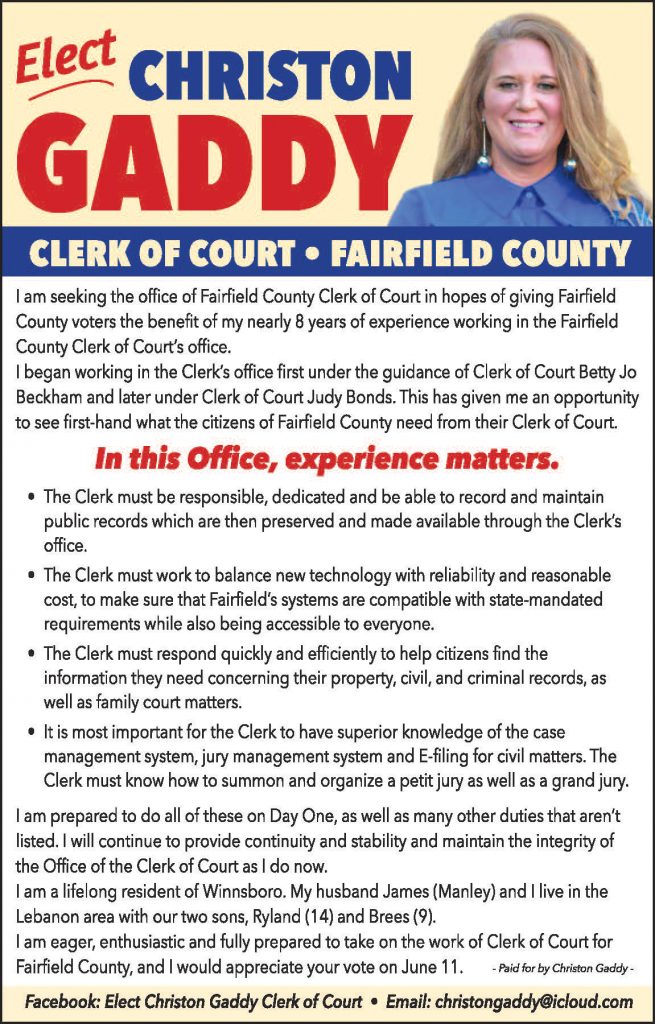EDITOR’S NOTE: Minutes before press time, The Voice was notified by Fairfield County officials that Fairfield School Superintendent Dr. J. R. Green had informed County Administrator Jason Taylor that Gorelick Brothers Capital, developer for the Teacher Village, announced the company is withdrawing from the project. The Voice will update the story online as information becomes available. The following story reflects events prior to Green’s announcement.
WINNSBORO – A North Carolina hedge fund seeking generous tax breaks to build a controversial “Teacher Village” housing project won’t budge on a stipulation that would protect Fairfield County from future lawsuits.
In an email obtained by The Voice, a representative of Gorelick Brothers Capital of Charlotte, North Carolina, said investors won’t move forward unless Fairfield County shares in the legal risk.
“The reason why indemnification is an issue is that we are not willing to bear the risk of indemnifying the County,” the memo says. “There is an unpredictable liability for us and we also want the County to be ‘invested’ in this project.”
Dated Aug. 30, the memo was addressed to Dr. J.R. Green, superintendent of the Fairfield County School District; and Sue Rex, chair of the Fairfield County School District Education Foundation.
The school district’s board of trustees created the foundation to facilitate development of the Teacher Village, which seeks to build affordable rental homes catering to teachers.
In the email, the Gorelick representative proposed telephoning Green and Rex to further discuss possible options. He suggested a date of Sept. 4.
“Do you have some time on Wednesday morning for a call? Maybe 10 am?” the email states. “We received feedback from the County and are at an impasse on one business point (indemnification), but there may be a solution that you could provide for the project.”
Green said he’d not spoken with Gorelick and could not confirm he had seen the email. He wouldn’t comment further on most other aspects of the email or indemnification.
“It’s Gorelick’s decision on how they want to handle that with the county,” Green said.
A Gorelick official couldn’t be reached for comment as of press time.
Rex affirmed that Gorelick adamantly opposes adding an indemnity clause to any Teacher Village deal.
“The Gorelick Brothers will not sign an agreement that requires them to indemnify,” she said. “They want this to happen but if that’s the final straw, they’ll walk away.”
Rex added that the foundation would bear some financial risk with the Teacher Village. If occupancy falls short, the foundation would have to cover any rent shortfalls, she said.
“We’re responsible after that occupancy rate to make sure that the rent payment [for unrented units] is made every month,” Rex said. “We’d have to still make the rent payment at the end of the month.”
Teacher Village critics say the email from Gorelick and lack of transparency surrounding it serve as further proof that the county’s indemnification is necessary.
“They [school officials] were still pressuring the county to make this thing go forward without telling the county they had received an email,” Fairfield County Councilman Douglas Pauley said. “For a year now, the thing we were most concerned about was indemnification for the county, and they knew that.”
Clause common in county contracts
Gorelick (pronounced guh-RELL-ick) wants the development designated as a multi-county business park to make it eligible for a tax abatement. The company is seeking a seven-year tax abatement totaling about $600,000 to finance the project.
Fairfield County has said it’s open to those requests, but also wants an indemnification clause to protect taxpayers.
County Administrator Jason Taylor said during the last council meeting that indemnification clauses protecting the county are common to any contract the county enters into.
The county is a co-defendant in a similar multi-county business park lawsuit filed over a student housing project in downtown Columbia. The county is incurring no legal cost on the lawsuit, however, because it has an indemnification clause in the deal that protects the county from liability. County leaders fear a similar suit could arise from the Teacher Village. For that reason, too, county officials say they are seeking similar protection with Gorelick.
County Attorney Tommy Morgan said at a recent council meeting that legal bills stemming from any Teacher Village litigation could cost “six figures” without an indemnification agreement.
But Gorelick won’t budge, saying indemnification essentially is a deal-breaker.
“If they [the county] believe in this project, they should be willing to bear some of the risk,” the email states. “If we are forced to bear the cost of indemnification the risk-reward equation is too negatively skewed for us to continue.”
Gorelick rejects offer
County Administrator Jason Taylor recently said the county pitched an alternative option establishing an escrow account into which Gorelick could periodically deposit funds to cover any possible future legal costs of the county.
“We were told by Gorelick that they would not do that,” Taylor said at the Sept. 9 council meeting. “Then we reached out to the school district and the foundation. We have not found that’s going to happen either.”
Green said Gorelick should ultimately decide whether or not to pay into an escrow account.
“That’s [part of] negotiations between Gorelick and the county,” Green said. “The school district doesn’t have the authority to pay into an escrow account on behalf of Gorelick. It’s Gorelick’s decision.”
Asked directly for the school district’s position on indemnification, Green said “that’s between Gorelick and the county.”
The indemnification issue first arose at a special Fairfield County Council meeting in November 2018.
At that meeting, Green called the inclusion of an indemnity clause to protect the county “not reasonable.” The county’s former council chairman felt otherwise.
“If we are going to be the ones to accept the risk for what many of us see as [someone else’s] property, then there are some conditions that we’d like to talk about,” former council chair Billy Smith said. “It’s not our project, we’re helping with someone else’s property. They should be willing to pay and hedge that bet on the risk.”
Since then, several council members have also said any Teacher Village deal should include legal protections for Fairfield County. Council members Bertha Goins, Clarence Gilbert, Jimmy Ray Douglas, Neil Robinson and Pauley are among them.
Email irks council member
Some Teacher Village supporters, including education foundation vice-chair Shirley Green, think the county should approve the deal despite the risk.
At the Sept. 9 council meeting – 10 days after the Gorelick email was sent – Green urged council meetings not to be deterred by potential litigation.
“Are we afraid to take a chance with someone else’s money? Are we afraid of failure or are we afraid of success?” Shirley Green said. “Don’t let the fear of a lawsuit or failure as it’s known to hold you back from the opportunities for success.”
Green didn’t mention the Gorelick email in her remarks.
Pauley thought it was particularly disturbing that neither the district nor the foundation officially disclosed the memo prior to the Sept. 9 council meeting.
“They are not even considering the taxpayers of Fairfield County. It is very disturbing to me that they were still willing to pressure the county go to forward,” Pauley said.
“At best,” he continued, “it [the email from Gorelick] confirms our concerns. At worst, it exposes those we considered partners trying to pull the wool over our eyes and over our citizen’s eyes. All for public risk and personal gain. If Council is the least bit sane, this will end the circus act,” Pauley said.
The Teacher Village proponents propose offering rent reductions for educators of about $300 a month. Phase I calls for 30 homes with up to 70 homes constructed if the development reaches 100 percent build out.
If teachers don’t fill the homes, first responders would receive dibs on housing followed by district staff. If empty houses still remain, the general public would be allowed to rent them according to Rex.
Only teachers, however, would qualify for the rent subsidy.
But school board trustee Paula Hartman doesn’t think teachers will flock to the Teacher Village as backers hope.
“I personally don’t think this is going to bring teachers here,” Hartman said. “There’s no proof anybody’s given us that teachers will be the ones in there.”
Gorelick anticipates spending up to $3.6 million on the development, contingent upon receiving a $600,000 tax abatement from the county. The proposal also includes at least $100,000 from a proviso in this year’s state budget, which would help fund the $300 rent subsidies.
Green, the school district superintendent, has said he thinks the proviso will be renewed in subsequent years, ultimately becoming permanent, though he acknowledged at a past council meeting there’s no guarantee.
Rent increases in subsequent years are also possible. In October 2018, Green told council members that rent could increase up to 2 percent a year.













